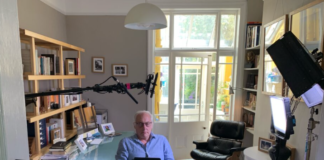- Rocket man - 2nd March 2026
- Death wish two - 2nd March 2026
- News to celebrate! - 1st March 2026

During 23 years with the BBC, and 40 years in journalism (when he was trained to use simple language, avoiding jargon), our Editor, Welshman Phil Parry, has watched as important party speeches set the scene politically, but the address to his conference by opposition Labour leader Sir Keir Starmer was accused of being a ‘snoozefest’!
Earlier Phil has described how he was helped to break into the South Wales Echo office car when he was a cub reporter, recalled his early career as a journalist, the importance of experience in the job, and making clear that the ‘calls’ to emergency services as well as court cases are central to any media operation.
 He has also explored how poorly paid most journalism is when trainee reporters had to live in squalid flats, the vital role of expenses, and about one of his most important stories on the now-scrapped 53 year-old BBC Wales TV Current Affairs series, Week In Week Out (WIWO), which won an award even after it was axed, long after his career really took off.
He has also explored how poorly paid most journalism is when trainee reporters had to live in squalid flats, the vital role of expenses, and about one of his most important stories on the now-scrapped 53 year-old BBC Wales TV Current Affairs series, Week In Week Out (WIWO), which won an award even after it was axed, long after his career really took off.
Phil has explained too how crucial it is actually to speak to people, the virtue of speed as well as accuracy, why knowledge of history and teaching the subject is vital, how certain material was removed from TV Current Affairs programmes when secret cameras had to be used, and some of those he has interviewed.
He has disclosed as well why investigative journalism is needed now more than ever although others have different opinions, how the coronavirus (Covid-19) lockdown played havoc with media schedules, and the importance of the hugely lower average age of some political leaders compared with when he started reporting.

They can seem boring, but actually they are very important.
Conference speeches set the scene politically, rally the troops, and may offer tasty morsels for the public about what these politicians actually intend to do.
So it is that I watched avidly as this year’s party conference season has unfolded, and those speeches were given.

The one by Sir Keir Starmer, however, reached new levels of tedium.
It is a shame, perhaps, that the protester who showered him with glitter, couldn’t also do it on his personality.
His seizing on “Sticking-plaster politics” will hardly send people to the barricades.


The mystifying phrase, “mission government our guide”, will not, even if it had been blessed with a verb, echo down the ages.
There were early warning signs that oratorical fireworks would not be Sir Keir’s strong suit.
As a young man he co-edited a paper called “Socialist Alternatives” in which he wrote articles rich in sentences such as: “Furthermore the new proposals …for a more centralised union mirror the new realist image of unionism as simply another tier of management”. Other pronouncements were even more fun than that!

It is a shame, perhaps, that he cannot generate the same level of adulation among supporters as Nicola Sturgeon, past leader of the Scottish National Party (SNP). She made a surprise visit to her conference at Aberdeen, (when she was accused of being “the Liz Truss of the SNP”), and arrived to cheers and applause from some in the hall. One woman even wept after seeing her, and received a hug from Ms Sturgeon.
Sir Keir must have thought ‘if only…’.

The key remarks in his conference speech, are hardly the rallying cries of days gone by – including from some of his predecessors.
The then Labour leader Neil Kinnock delivered one of the most fiery speeches of his career at the party’s 1985 conference in Bournemouth, which saw him heckled and one MP walking out in protest.
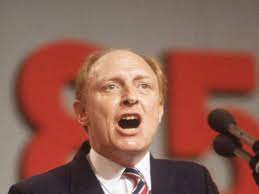
He denounced the “grotesque chaos of a Labour council… hiring taxis to scuttle around a city handing out redundancy notices to its own workers”.
Derek Hatton, then deputy leader of the council at the centre of what he said, Liverpool, and a leading member of the extreme left wing group Militant, yelled “liar” throughout the delivery of the speech, and Eric Heffer, then MP for Liverpool Walton, stormed out.
In fact there have often been protests during key Labour speeches, although none of them have involved glitter!
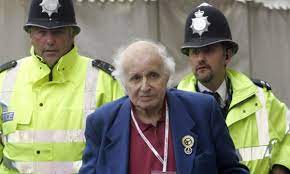
In what was seen as a heavy handed response by a stage-managed party, two security guards removed 82-year-old Walter Wolfgang from Labour’s conference in 2005 for heckling Jack Straw during the then Foreign Secretary’s speech.
Mr Straw told the audience the UK was in Iraq: “for one reason only – to help the elected Iraqi government build a secure, democratic and stable nation”, to which Mr Wolfgang cried “nonsense”.

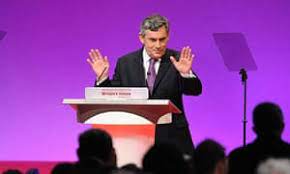
He was then forcibly removed from the hall, had his pass seized, was detained and later prevented from re-entering the conference by police acting under the Prevention of Terrorism Act.
A year after this awful incident, and with Labour Prime Minister Tony Blair’s spell in power drawing to an end amid the continuing fissure with his chancellor Gordon Brown, another huge controversy developed.

In his conference speech (effectively his pitch to succeed Mr Blair), Mr Brown wanted to demonstrate a united front, and declared that it was “a privilege to work with the most successful ever Labour leader and Labour Prime Minister”.
But afterwards Cherie Blair walked unknowingly straight into the path of a journalist, and said: “well that’s a lie”, putting paid to Mr Brown’s illusion of unity, although she later insisted to reporters: “I didn’t say it”.
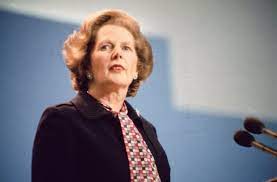
Yet important speeches at the party conference have not simply come from key Labour figures, political opponents have made them too.
Margaret Thatcher came up with a lot for example (although they largely weren’t written by her), and one of the most memorable was after the IRA had tried to murder her.
In the early hours of an October morning in 1984, they detonated a bomb inside the Grand Hotel at Brighton where Mrs Thatcher was staying with her cabinet, killing five people, and Mrs Thatcher famously tore up her planned Labour-bashing speech, in which she was due to accuse the party of being “the enemy within”, and instead delivered a defiant alternative.
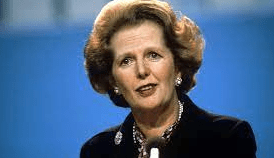
She told delegates: “The fact that we are gathered here now – shocked, but composed and determined – is a sign not only that this attack has failed, but that all attempts to destroy democracy by terrorism will fail”. The remainder of the conference, she added, would be “business as usual”.
So conference speeches don’t have to be boring.

I just can’t see, “mission government our guide” written on placards…
The memories of Phil’s decades long award-winning career in journalism (when watching party conference speeches was always central) as he was gripped by the rare neurological disease Hereditary Spastic Paraplegia (HSP), have been released in a major book ‘A GOOD STORY’. Order it now.












